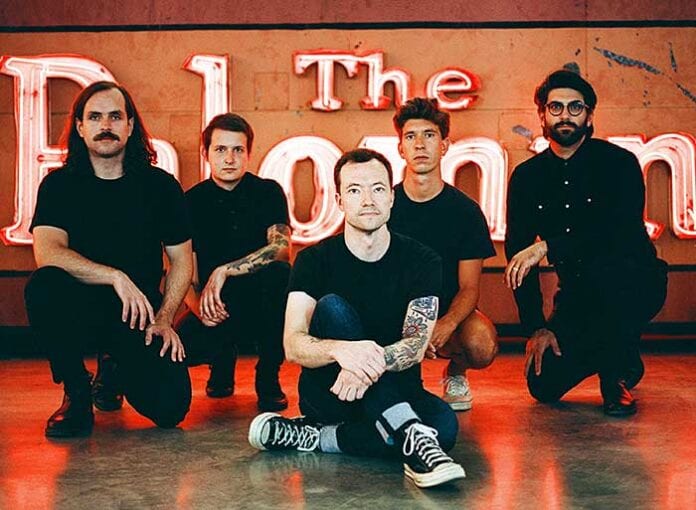
INTERVIEW WITH JEREMY BOLM BY NATHAN KATSIAFICAS
PHOTOGRAPHS BY GEORGE CLARKE
We sat down with Jeremy Bolm of post-hardcore heavyweights Touché Amoré to talk about how he’s been keeping sane during the pandemic, the band’s upcoming full-length Lament, working with famed producer Ross Robinson, his new podcast, the future of live music, and more.
Let’s start by addressing the elephant in the room. How has COVID impacted Touché Amoré’s plans this year? What would you be doing if we weren’t in the midst of a pandemic?
Thankfully right now, we’re lucky that the time between recording and releasing a record is usually downtime anyway. So currently, nothing is changed in the sense that we wouldn’t be playing shows right now anyways, but it’s certainly held us back from announcing a US tour, which we would’ve done with the release of the record. I think we’re all trying to use this time to dive into other things to keep ourselves busy. I started a podcast, which has been nice. That’s certainly the least unique thing I could’ve done. I also have a record label that I most recently have been putting out a lot of poetry stuff on. On September 9th, I announced the next release I’ll be putting out musically. I haven’t put a band out on that label since 2017, which was Gouge Away. So, I’m excited about that. It’s a great band from Philly called Soul Glo. Their new EP is so, so good! I’m just trying to fill my time with stuff that’s positive because the world is so incredibly fucked up, negative, horrible, depressing, and sad, so balancing those things is tough.
“I’M JUST TRYING TO FILL MY TIME WITH STUFF THAT’S POSITIVE BECAUSE THE WORLD IS SO INCREDIBLY FUCKED UP, NEGATIVE, HORRIBLE, DEPRESSING, AND SAD”
It’s been pretty horrible recently, losing Riley Gale from Power Trip…
Yeah, it’s a hard place to be right now. Riley and I had been talking so much this last month, and we talked on Saturday. He passed just a couple days later. That definitely threw me off my axis completely. It’s been tough, but we’re all trying to get by the best we can.
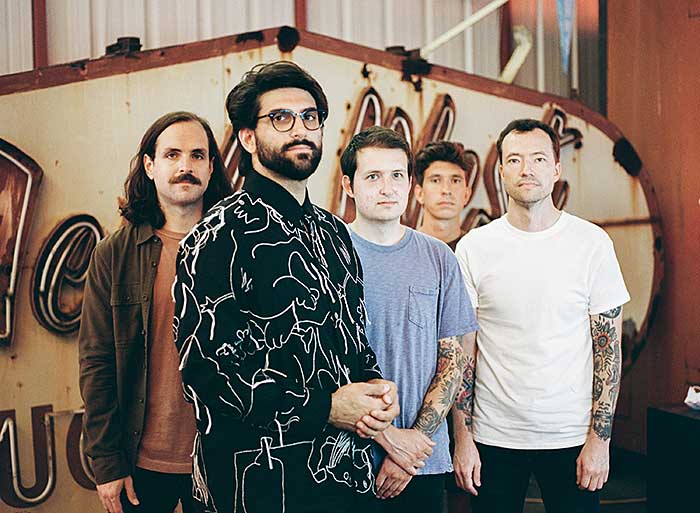
What has the band been doing to stay sane and keep in contact during this?
We’ve only seen each other maybe three times now since finishing the record. That’s not odd for us, we all live in Los Angeles, but all live totally our own lives. I think that’s what kept us together as long as we have. We have such a great relationship, but it’s predicated on giving each other space. So, we’ve had to do a couple of photo shoots and then we did a music video a couple of weeks ago.
How did that go, shooting a music video?
Sucked (laughs), it sucked! Music videos are already their own beast, but it was just a really big pain in the ass for the right reasons. Everyone had to be tested the day before, which is great to do, but just all the stipulations that came along with it, it was really difficult and really nerve-wracking, too. I’m glad we pulled it off, but it was certainly challenging.
“IT’S GIVEN ME AN APPRECIATION FOR THE PEOPLE IN MY LIFE THAT HAVE BEEN THERE FOR ME IN A REALLY LOVING WAY”
How did the four year gap since Stage Four influence the topics you wanted to explore on Lament? What place was your head at for the new record after putting so much of yourself into Stage Four?
I look at this record as a companion piece to Stage Four in the sense of I’m not singing about my mom specifically, but I’m singing about my life since that record and how my life has been affected since releasing that record, positively and negatively. All about how it’s given me an appreciation for the people in my life that have been there for me in a really loving way, and about how, writing that record, I wasn’t thinking I’d be setting myself up to becoming the spokesperson for people who have lost their parents. So, that’s been a really hard thing to navigate mentally. I think that plays a lot into the record as well. But also songs like “Reminders,” which I wrote the day that Trump was not removed after being impeached. And there’s a line on “A Forecast” where I compare the GOP to cancer. So, there’s definitely a little bit more political leanings on the record than normal. Usually, I save my political commentary for my other band, Hesitation Wounds. That’s usually my outlet for that and I try to keep Touché more personal, but at this point there’s literally no way to not have politics infringing on your personal life.
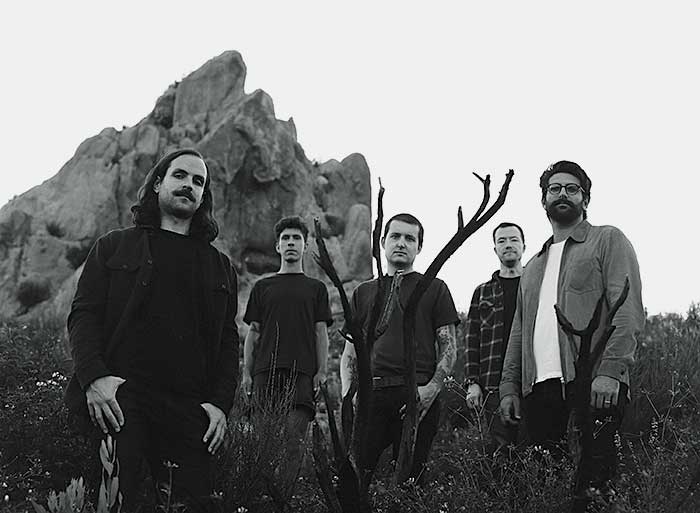
You worked with the famous, and infamously intense, Ross Robinson [Korn, Glassjaw, At the Drive In, Slipknot] for the first time on this record. How did you link up with him and what did he bring to the process for you guys?
Our manager managed At the Drive In throughout their entire career up until when they broke up—once they got back together he wasn’t with them anymore—so he was there for their album Relationship of Command. And we had met Ross in a really weird way a few years ago, but I don’t think it left an impression? It was a weird circumstance where he was recording this band from Spain called Berri Txarrak, and that year we, very flatteringly, won best international record for this magazine in Spain. We had never been there before so we were really taken aback by it. And they won best album of the year for Spain. So, we got approached, “Hey, do you want to do a joint photo shoot with this band, they’re recording with Ross Robinson in Venice?” And we were like, “Sure, why not?!” We showed up and the photographer was, “Oh, so you guys know each other?” And we were like, “No, we’ve never met!” Even the photographer thought, wow that’s kind of bold! But we got along swimmingly with them and we’ve been friends ever since. I remember we met Ross really briefly and I was super star-struck by him because yeah, he’s infamous and he’s been a big part of my musical journey since I was a child.
I remember talking to the lead singer of Berri Txarrak to find out what it was like working with Ross, like “Is it as crazy as people say it is?” He told me what to expect, like what the process was and that stuck in my mind. And then when this opportunity came, I talked to Liam [Cormier] from Cancer Bats because he’s recorded with him and I talked to Justin Pearson of Dead Cross, and they all told me the same thing, so I knew what I was in for. We recorded a song called “Deflector,” which is on the record, but we did that last year as a way to test it out. It’s not lost on me how special that is because Ross isn’t the kind of guy that does things like that, but because of his history with our manager and maybe his interest in the band, he was open to it.
“YOU READ THE LYRICS TO EVERYBODY ALOUD AND GO LINE BY LINE AND EXPLAIN WHAT EVERY SINGLE LINE IS ABOUT.”
It was just like they described. He’s gonna make you go into the room with everybody when you go to track drums. And he’s gonna make you read the lyrics to everybody aloud and go line by line and explain what every single line is about. And he’ll ask questions on the lyrics and he’ll ask every member of the band how that’s making them feel and just get really, really involved, which is uncomfortable. But it’s crazy, normally when you record, the drummer plays all the drums to a scratch guitar track or something. But for his records, Ross makes the entire band play, including the singer singing every single time. So, while we’re rearranging the song, Ross is throwing out all these ideas for changing drum parts or whatever. He’s having everyone play and me sing every single time. I sang those songs probably upwards of a hundred times just to get the drums.
Was that chaotic for you?
He was sympathetic to the fact that I’m yelling. He didn’t make me go full hard, just keeping up with everyone and keep them in the spirit of the song. But what’s crazy is he keeps all that stuff. There were times when I was singing on those…he used scratch tracks from that early stuff for a part of the record. It was very much a “That’s where you’re in it, you’re very emotional there, so we’re going to use that” type of thing. Being genuine and being present is the most important thing to Ross. We learned each other’s boundaries and each other’s seriousness in that tryout process.
I had a hard time with him when we did “Deflector,” because I was so nervous about the process and full of fear from all the stories I’d heard. He made it really intense—like he stands in the vocal booth with the singer the whole time and he’s like a foot away from you and talking to you about what you wrote. I’m a stranger to him at that point, and he was pushing on things that weren’t the right things to push on. So, we got into it and I feel like we were in that booth for two hours and I think I only sang like three times in that two hours because of the amount of back and forth we were having. I’m not a confrontational person at all, but it was just finding the middle ground to what was appropriate. I think it was important because he learned that I genuinely care and work very hard to write and am very committed to this. I don’t want to speak out of turn or assume, but I think he’s likely dealt with some bands that maybe have vocalists that don’t pour as much of themselves into their records as we do?
“IT’S NOT UNIQUE FOR THE SINGER OF THE BAND PROMOTING THE BAND TO SAY THAT, BUT I GENUINELY FEEL IT IS OUR BEST RECORD.”
After that process, when we came in to do Lament, Ross no longer felt the need to stand in the vocal booth with me, there was a trust that was built. When we started the record, before I did vocals, he would come into the room and we’d talk for maybe 30 minutes to an hour about the song, about everything. We would tell each other stories, we would get each other in a place where we felt very connected to what we were doing, and then he’d just say, “Alright, let’s go,” and he’d go downstairs and I would start tracking. It was still a little bit uncomfortable, but at the same time I was no longer intimidated by him because I knew that everything he was doing was coming from a place of love and trying to get the best out of us. I would do a hundred more records with Ross. He got the best out of us honestly, and I know it’s not unique for the singer of the band promoting the band to say that, but I genuinely feel it is our best record.
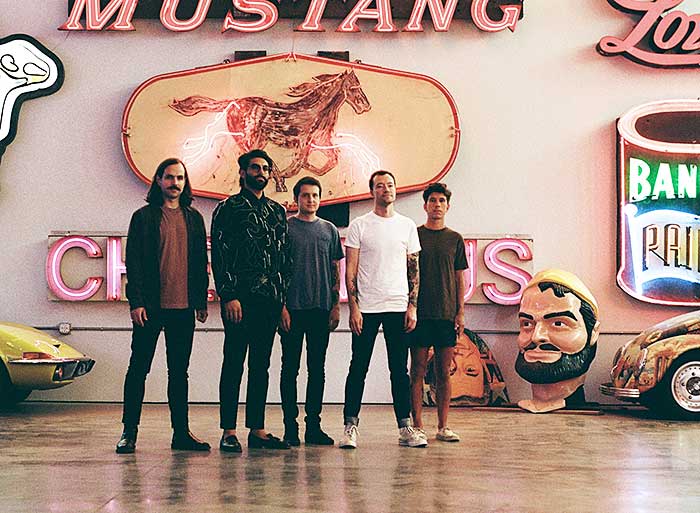
I wholeheartedly agree, though I loved Stage Four as well!
Thank you, that’s nice to hear. Yeah, I would’ve always said that Stage Four was our best record just because of the maturity of it, but I don’t look at it as a record that I enjoyed making. I’m glad we made it—it was necessary, it was therapeutic and all of that, but I don’t think back to that time as, “I had such a great time writing this record with my friends!” It was like I needed to do it. And I loved recording the record with Brad Wood because he’s my fucking guy, and I would take a bullet for him. But, again, I don’t have these really, really fun, happy memories of being in the studio. The whole time I was just involved in what I was having to do. Lament is the first record where I got to genuinely pour all of myself into a record in a way that was more creative as opposed to necessary.
“LAMENT IS THE FIRST RECORD WHERE I GOT TO GENUINELY POUR ALL OF MYSELF INTO A RECORD IN A WAY THAT WAS MORE CREATIVE AS OPPOSED TO NECESSARY.”
How did Andy Hull of Manchester Orchestra end up contributing his vocal talents to “Limelight?” Was that planned before writing it or did it come to fruition afterwards?
I’ve had a good friendship with Andy for a few years. There’s a cool arc to the story, where I wrote about him on It’s Survived By. In the song “It’s Hard to Write Content,” I talk about the first night we met. We’ve stayed friends since then, and they’re one of those bands we all love and we’d thrown around the idea of doing a split with them, and it’s never come to fruition. They’re busy, we’re busy, we just have completely different release schedules so it just never lined up. “Limelight” was the first song that we wrote for this record, probably at the end of 2018. It always felt like it needed something else to me, but I couldn’t put my finger on what it was. Once we did the pre-production demo of it, which we recorded in the same session as when we did the re-recording of …To the Beat of a Dead Horse, listening to it, I was like, “Oh man, this would be a really good opportunity to have Andy.” So, I sent him the demo of it and he responded saying, “Yo, those are my kinda chords!”
Once we got in the studio and sent him the actual song, the original idea was to have him do some pretty “oohs and ohs” and that kinda shit, but on the morning he was going to record, he texts me a photo of like eight or 12 lines of lyrics he wrote and asked if he could try it. I told him, “Of course, we’re super down for that.” So, we were sending each other updates and videos of himself trying different things. I told him I was so thrilled, it all sounded so great. He said he’d still do the “oohs and ohs” in case everyone wasn’t on board, and those are heard on the song in the instrumental outro, that was like the backup plan. But Ross heard the part he did and said, “Let’s just use that here,” and it turned into such a beautiful experience. I’m so thankful for Andy for doing that. He brought so much to that I feel like it’s two songs put into one, like that first three minutes could just be a song but then that part happens. It’s my favorite thing that’s ever happened in a Touché song, and I like it because I’m not involved in it as he’s doing the part and I’m like, “Man, I really enjoy that!” And then having us scream together and yell together over that last part, it makes me nervous about having to play it live without him. Hopefully, by the time concerts happen in 2029 or whatever the fuck, people know the song and I can just rely on the audience to do the Andy part.
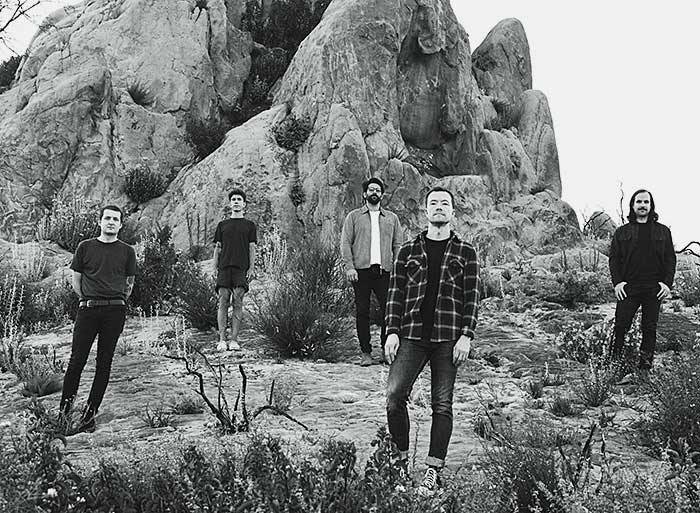
Lament is much more optimistic than the band’s past efforts, despite the current political climate and events that are continuing to unfold. What hopes do you have for the next few months and the upcoming album cycle?
I hope that Trump is kicked the fuck out of Washington DC and that we never have to hear him talk again. I don’t think that I’m going to be that lucky, but if I could live the rest of my life without ever hearing his goddamn voice, I think that will do wonders for so many people’s mental health. That would be wonderful and just an all-around change in the political climate in general. I would love to see the police defunded, I would love to see a new president, kids out of cages, the wealth distributed better in this country, and I would love to see climate change be taken seriously. That’s just off the top of my head. I think you know where I’m going with this.
“I HOPE THAT TRUMP IS KICKED THE FUCK OUT OF WASHINGTON DC AND THAT WE NEVER HAVE TO HEAR HIM TALK AGAIN.”
But on top of that, I would love to see people to be able to connect again, and for COVID to be solved in a way that isn’t further jeopardizing people. I think it was Collin [Frangicetto] who plays guitar in Circa Survive and did one of those Twitter polls asking, “If there was a vaccine tomorrow, would you take it?” And this is something I hadn’t thought about, and the amount of people who were like “Nah,” or “Probably not,” my gut reaction was just “WHY NOT?! We need to get back to normal!”
But I hadn’t considered we don’t know what the side effects of this shit is going to be. We can’t expect people to just want to take a vaccine when we don’t know what that’s going to mean. And I’m not going to trust the Trump administration to give us a vaccine because all they’re thinking about is opening up the economy. They’re not thinking about the blowback or what this all means. I hope to see this resolved in a way that is hopeful and beneficial. That would be the most wonderful thing. Because at this point, I think most of us have someone that, either a friend of a friend or whatever, has been affected by COVID in a really terrible way. Thankfully, no one in my life has passed from it, but I’ve had friends whose parents have been sick. I hope that we can see an end to that soon.
Watching venues close and businesses close is just tough. It’s like an added level of depression that I don’t think anyone wants. Our genre is unfortunately the one that I think is going to be most affected by this because our genre requires crowd participation and intimacy. I’ve been joking, like my fucking job is being patient zero and sharing germs—the amount of spit and yelling into mouths on a nightly basis, I’ll be the first one to go and to share. I want to make sure that I am in a safe position and that everyone else can enjoy themselves, so we can just go back to sharing common colds with one another. That’s the hope!
“I REALLY HOPE THAT THIS RECORD CAN BRING SOME SORT OF JOY TO PEOPLE AND SOME COMFORT. WE WERE OBVIOUSLY NERVOUS ABOUT RELEASING A RECORD WHEN THERE’S NO FUTURE FOR MUSIC.”
If I’m going to bring it to a band point, I really hope that this record can bring some sort of joy to people and some comfort. We were obviously nervous about releasing a record when there’s no future for music. But we decided to still do it because everyone else pushed their records, and we might as well release it at a time when there’s not a lot of competition. That was the idea, which feels a little selfish. But the response that came from that was so uplifting and so comforting with people saying now they had something to look forward to. And it translated in such a way—and by no means do I intend to brag—that was the best preorder we’ve ever had for a record. I think that people just need this sort of thing right now, which has just been really, really inspiring for us to be like, “Wow, this is awesome that we can bring some sort of joy to people.”
You have a new podcast called “The First Ever Podcast” that launched in July that has already had Andy and other notable figures in Touché Amoré’s orbit on it. What is your vision for this podcast, and can you share who might be coming on soon?
Yeah! I really like talking to people that are involved in art forms that I’m unfamiliar with, or not even unfamiliar, but like hearing the stories of someone. I interviewed this person named Madeline Horwath who is a cartoonist for The New Yorker. That to me is an interesting life, like I have no idea about the process of getting into The New Yorker. Having that conversation, to me, was more interesting than fronting a hardcore band. As much as I love talking to those people too, talking to someone who comes from this different art form is more interesting to me, and I hope that over time that becomes a selling point to people who are listening to the podcast. When I look at the figures of plays in general, like how well certain episodes perform, obviously talking to someone like Brendan [Yates] from Turnstile is gonna get a lot more listens because that’s in my orbit, as you said, that’s in my world. And I want people to listen to that episode because he’s the coolest, but I hope that over time people get that same level of excitement that I get talking to someone who is involved in other things.
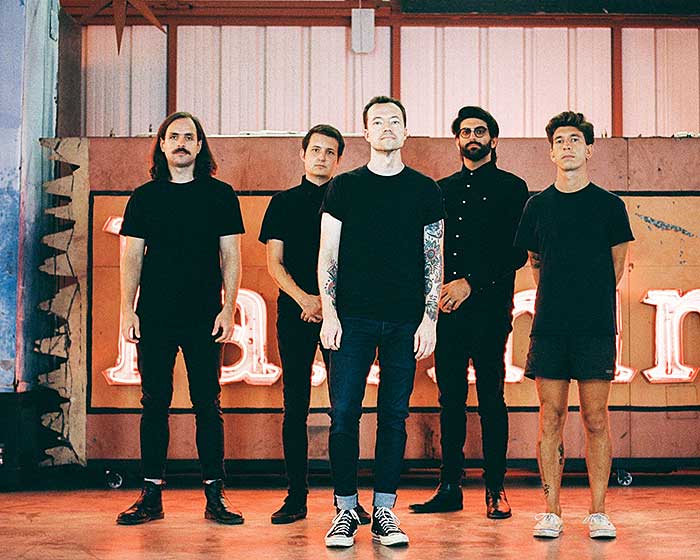
It’s not lost on me that just because you listen to Touché, you like Turnstile or Code Orange or whoever else, that that’s not your only interest. I hope that someone who draws is excited to listen to me interview Nick Steinhardt about design work and working towards that. That would be fulfilling for me. As for what’s coming up, I had an unsuccessful interview today because the feed kept falling out and it was the most embarrassing thing. Thankfully, it was a friend—an artist named Alex Pardee. He’s an illustrator that does a lot of really incredible stuff. He’s not known for album art, but he has done some. I think he did one of The Used’s album covers from one of their more popular records. He’s done a lot of hip-hop stuff too, like Aesop Rock and stuff like that. He’s super awesome. We’re gonna have to redo the interview because we just had to give up. Tomorrow I’m interviewing this singer that goes by the name Scary Pool Party—his name is Alejandro Aranda. He was on American Idol, he was a runner up in season 17 I think, but it turns out that he’s a Touché fan. He’s from here in Pomona, not far from where I live and grew up on punk and hardcore and stuff, but has this amazing songwriting and soulful, beautiful voice. I’m excited to talk to him tomorrow. He’s part of a world that I don’t understand how it works. He’s on Hollywood Records and is quite famous in the soul/R&B world. I’m sure it will be a cool conversation. It’s wild to have that mutual respect where we’ve never met before, but when I messaged him he was super excited to talk to me.
Tomorrow, my interview with the singer of Cursive, Tim Kasher, will go up, but yeah, I’ve got ideas. So far it’s been fun for me. I hope it doesn’t start to feel like a chore when things start to go wrong. I feel like once the pandemic hit, everyone went out and bought a microphone and started a podcast, so I don’t feel the most original, but I’m enjoying it! It’s helping me get over some of my own self-consciousness, like I always feel self-conscious about my speaking voice. I like talking to my friends about art form, but always in the comfort of a backstage room or a phone call. Doing it when it’s recorded adds a level of nervousness. I’m sure you’ve felt these things before, too.
“PERFORMING LIVE IS SUCH AN IMPORTANT PART OF WHAT WE DO AND IT’S SO IMPORTANT TO US THAT WE HAVE THAT CONNECTION WITH PEOPLE IN PERSON.”
Will Touché Amoré be doing any sort of virtual performance or live streams to celebrate Lament? Maybe a moderated Q&A?
We’re trying to figure that out. I’m assuming release week we’ll do something. We’re actually getting together tomorrow night for the first time to practice actually. So yeah, that’s on the horizon, we’re planning something like that for sure. I’m happy to do a few here and there, but I’m cautious to do too much of it because I fear that if this becomes too much of a norm, it was already tough when we were touring years before, when it was like competing with other tours in town. Then these last couple years, sadly, touring became a competition with Netflix, where people are, “I’d rather just stay home and watch TV.” And I get it, you’re already paying for that subscription and money is tight, but it became depressing that that became a thing to compete with. This might be me thinking too much into it, but I fear that with a little bit of a younger generation that there might be some of that “I already watched them online, I don’t need to go to see them at a show” vibe. I’m looking at it like there’s so many things that make it tough for the artist to still monetize, and performing live is such an important part of what we do and it’s so important to us that we have that connection with people in person. I hope that people don’t get too comfortable with just watching their favorite bands play on their phone or TV.
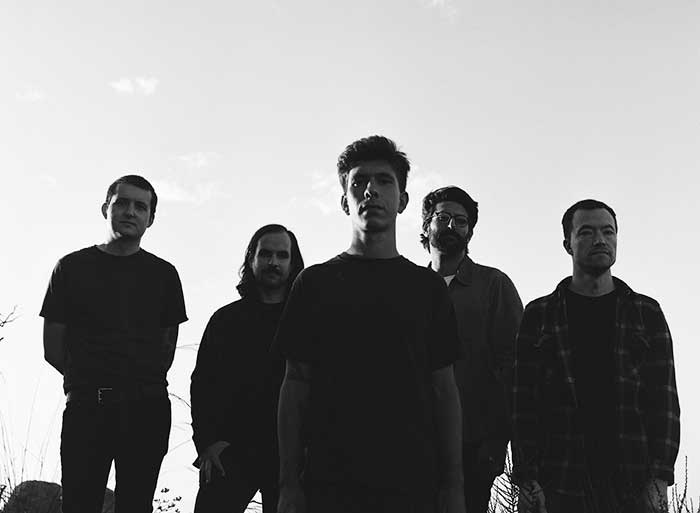
And with Touché Amoré, the music just doesn’t translate the same as it would live with fans screaming along and stage diving, right? Exactly. Agreed! That’s actually one of the things I was talking with Riley [Gale] about. He was talking about figuring out how to do something online like this soon and in so many words, he was, “Are we that exciting to watch without an audience? I’m sure we’ll play good, but after a few songs, is it still entertaining, is it still engaging?” And I get it, when we do something like this we’re gonna have to do something special. Code Orange’s live thing when their record came out with the visuals and all that was really inspiring, and I think a lot of us are trying to do something else like that to really bring people in. I applaud them for really stepping up and jumping to the opportunity to do something quite impressive in the absence of being able to play shows after putting out a record. We’ll do our best, we’ll play the part, we’re happy to perform, and it’s nice to play with my friends.
“IT’S BEEN REALLY COMFORTING SEEING THAT WHILE WE ARE ALL GOING THROUGH A REALLY HARD TIME, FANS ARE REALLY THERE FOR ALL OF US.”
Getting together tomorrow is going to be really nice. It’ll be our first time playing these songs together since we recorded them, so we’ll have to relearn them in a lot of ways. As for doing it often, I might swallow my foot saying this, we might end up doing more than I expected and I might really enjoy it, but I think there’s gonna be a little piece of me that is going to be hesitant and maybe a little apathetic towards doing too much of it because I am going to miss the audience aspect of it so much. At the same time, it’s been really moving to see how supportive fans have been for bands in general, whether it’s bands doing Patreons or Gofundme’s or paid streaming. It’s been really comforting seeing that while we are all going through a really hard time, fans are really there for all of us. We’re conscious of that in a way too, that we don’t want to ever feel like we’re taking advantage of anybody either. We’re trying to make sure that there’s enough room for all of us because we’re all suffering through this, to make the most of our time and get the attention we deserve for putting out a record during this crazy time.




















